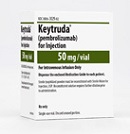Targeted cancer drugs are supposed to be the win-win for pharma and payers--for pharma, because they're aimed at smaller groups of patients, justifying higher prices and potentially speeding development; for payers, because they only have to foot the bill for patients who are likely to get results.
 But as the rivalry between Bristol-Myers Squibb's ($BMY) Opdivo and Merck & Co.'s ($MRK) Keytruda shows, the theory isn't always true in practice. Merck, which has zeroed in on PD-L1-positive tumors from the get-go, is bedeviled by some of the classic marketing problems suffered by other targeted meds.
But as the rivalry between Bristol-Myers Squibb's ($BMY) Opdivo and Merck & Co.'s ($MRK) Keytruda shows, the theory isn't always true in practice. Merck, which has zeroed in on PD-L1-positive tumors from the get-go, is bedeviled by some of the classic marketing problems suffered by other targeted meds.
Specifically, it's a diagnostics problem. As The Wall Street Journal reports, time-challenged cancer doctors don't want to delay treatment by using a PD-L1 assay to decide which drug to use. It takes time to order the test and wait for the results--sometimes three to five days for analysis--Quest Diagnostics ($DGX) told the newspaper. Then, the oncologist has to call the patient back into the office and decide what to do next.
Because Bristol-Myers tested all comers in its Opdivo trials, rather than focusing on PD-1 expressers, its drug is approved for all groups. That obviates the need for a test, even though there's a diagnostic approved for use alongside the med. So, Bristol-Myers has been aiming at all patients for the indications in which Opdivo is approved, and so far has about 60% of its market, the WSJ says.
 |
| Merck's Adam Schechter |
Plus, with its narrower PD-L1-specific approval, Merck is reimbursed for only for PD-L1-positive patients. So if doctors were to prescribe the med without the test, payers wouldn't cover it, as President for Global Human Health Adam Schechter said during the company's Q4 earnings call.
The good news for Merck is the fact that insurance coverage is extended no matter the size of the test results--patients with at least 1% PD-L1 expression get the drug just as well as those above 50%, even though the response has proven better in the latter group.
The company isn't ignoring the testing problem, of course. During the earnings call, Schechter said Merck is working to make PD-L1 diagnostics standard procedure in lung cancer, as part of Keytruda's rollout as a second-line treatment for lung cancer--and in preparation for a hoped-for approval in patients who haven't been previously treated. "We are building a critical foundation for PD-L1 testing in lung cancer as we launch in second line," Schechter said. "We believe this will help to set the stage for when our first line indication is achieved."
- read the WSJ piece (sub. req.)
- get the transcript of Merck's call
Special Reports: The top 20 drugs in 2020 - Opdivo - Keytruda | Top 15 pharma companies by 2014 revenue - Merck - Bristol-Myers Squibb